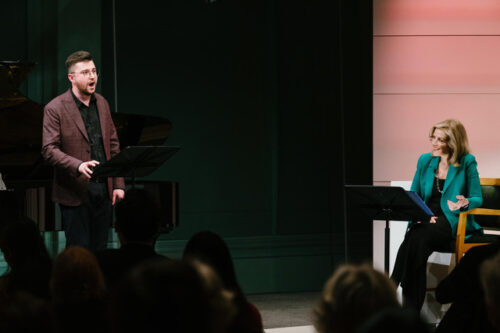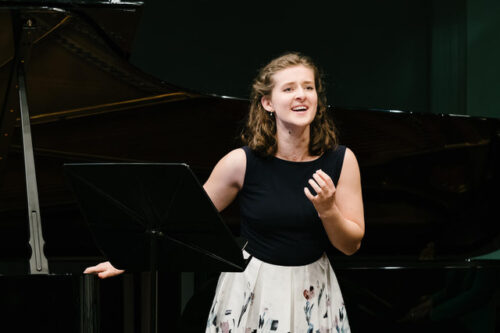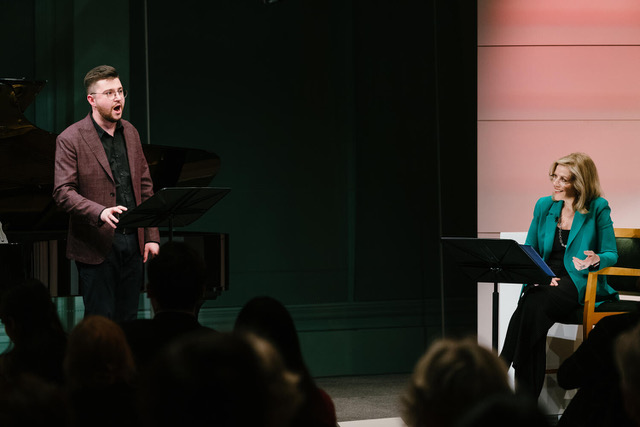 United States SongStudio 2023: Renée Fleming (host and artistic director), Hartmut Höll (piano), Golda Schultz (soprano), Jamie Barton (mezzo-soprano). Carnegie Hall, New York, 30.1-4.2.2023. (RP)
United States SongStudio 2023: Renée Fleming (host and artistic director), Hartmut Höll (piano), Golda Schultz (soprano), Jamie Barton (mezzo-soprano). Carnegie Hall, New York, 30.1-4.2.2023. (RP)

Performers:
Eirin Rognerud (soprano) / Malte Schäfer (piano)
Julie Roset (soprano) / Liza Armistead (piano)
Charlotte Wajnberg (soprano) / Aaron Wajnberg (piano)
Maire Therese Carmack (mezzo-soprano) / Pei-Hsuan Lin (piano)
Shannon Keegan (mezzo-soprano) / Yun-Ho Chen (piano)
Zhuohan Sun (tenor) / Yuriko Watanabe (piano)
Travon Walker (tenor) / Hikaru Kanki (piano)
Yuriy Hadzetskyy (baritone) / You Zhao (piano)
Joël Terrin (baritone) / Cole Knutson (piano)
Vinícius Costa (bass-baritone) / Hikaru Kanki (piano)
Renée Fleming has often referred to SongStudio as a bootcamp for singers. Given the exceptionally high quality of the ten pairs of emerging singers and collaborative pianists who participated in this year’s program, a more apt term would be finishing school.
The young artists came from 12 countries and most are multi-lingual. (One, according to Fleming, speaks seven languages.) What they share, apart from extraordinary musical talents, is a passion for song.
Most of the hard work is done in private sessions, but there are also public master classes. Pianist Hartmut Höll and Fleming were present as in the past; this year, soprano Golda Schultz and mezzo-soprano Jamie Barton were on hand as well. For the participants, it is a chance to get valuable exposure and feedback from some of world’s greatest exponents of song. Auditors, however, are equally rewarded.
It may be just a song, as Schultz said, but the goal is to tell a story. More importantly, you have to love doing it. A beautiful voice is just ground zero for a singer, Schultz explained, as it is merely the vehicle to express how the words and music makes you feel. The artist’s job is to make an audience experience those emotions too.
After listening to a song performed in its entirety, Schultz generally posed the question, ‘How can I help you?’. For soprano Charlotte Wajnberg, who was accompanied by her husband. Aaron Wajnberg, that meant delving into the Romani death rituals that haunted Joseph Jongen’s ‘Chanson romaine’. It is a topic that Schultz, who is a voracious reader, surprisingly knew quite a bit about.
With Zhuohan Sun, Schultz found communication easier by conversing with him in German. When she said something that clicked, you could see the lightbulb turn on in his head. His first run through Robert Schumann’s ‘Abends am Strand’ revealed zeal and an impressive instrument, but their work together yielded a performance that conveyed the song’s tales of shipwreck and far-off lands more vividly. When finished, Schultz congratulated him with ‘Thank you for teaching us how to sing’.
Zhuohan Sun provided another highlight of the week singing Frank Bridge’s ‘Love went a-riding’. Yuriko Watanabe created a windstorm of sound that the tenor road with as much brio as did Love astride Pegasus soaring skyward of whom he sang.
This was a homecoming of sorts for Barton, as her first performance in New York City was in 2011 when she was a participant in Marilyn Horne’s The Song Continues, the predecessor to SongStudio. She reiterated what Schultz had said earlier – performing a song is all about telling a story – and added that singers paint with the voice, just as an artist does with color on canvas.
For soprano Julie Roset, that meant not only with words but also pure sound in Eva Dell’Acqua’s ‘Villanelle’. Her coloratura and vocalizes were as charming as they were expressive. Roset coached Rachmaninoff’s ‘Ne poj, krasavica, pri men’ with Fleming and sang it in the final recital, but the lightness and beauty of her voice in ‘Villanelle’ was truly special.
It is impossible to put Barton in a box, but she did show a special affinity for her Fach in working with mezzo-sopranos Shannon Keegan and Maire Therese Carmack. In Herbert Howell’s ‘King David’, Keegan sang of the man’s profound despair heightened by the singing of a nightingale. Barton urged Keegan to similarly alleviate the sorrow of others by becoming that bird. ‘King David’, however, was one of the freeze-frame moments of the entire week.
Sumptuous hardly begins to describe Carmack’s dusky, lush voice. She sang Richard Strauss’s ‘Befreit’ and Jake Heggie’s ‘Animal Passion’ in the recital. The former throbbed with emotion and displayed her cavernous lower range, while the latter was pure fun. Undine Smith Moore’s ‘Love Let the Wind Cry’, which she worked on with Barton, was an outpouring of exaltation which convinced everyone that this singer was in love with love.
Fleming first heard Hartmut Höll perform with Dietrich Fischer-Dieskau when she was a student at The Juilliard School. They have performed together in recitals in Europe, Australia, Asia and the United States, and recorded together as well. His holistic approach to song performance is revelatory, as well as his ability to convey emotion through his playing. Even more impressive, perhaps, is his capacity to express his thoughts so eloquently in words.
Time mattered less to Höll than to the others when perfection was the goal. With an audience that hung on his words and the notes he played, there were no objections. The chief beneficiaries of his attention to detail were Charlotte and Aaron Wajnberg performing Berg’s ‘Nacht’ from Sieben frühe Lieder. No detail escaped his attention in his quest to transform a perfectly fine performance of the song into something transcendent.

Baritone Yuriy Hadzetskyy, however, gave Fleming the opening for the best line of the week. She suggested that he try to make his voice less beautiful in Barber’s ‘Night Wanderers’ to assist in telling the story. He responded, ‘I get that all the time’. She turned to the audience and quipped, ‘We should all be so lucky’.
To display his talent as a storyteller, Hadzetskyy chose two of the great ballads in the German repertoire, Wolf’s ‘Der Feurreiter’ and Schumann’s ‘Belsatzar’. The songs also have terrific piano accompaniments, which You Zhao performed brilliantly. In the final recital, they brought elegance, drama and excitement to the Schumann and Vaughan Williams’ ‘Bright is the Ring of Words’.

Elegance was the hallmark of soprano Eirin Rognerud’s singing. She also had the benefit of partnering with Malte Schäfer, a particularly engaging pianist. They delved into the conversation elements of Schubert’s ‘Im Frühling’ with Schultz, and the more passionate sentiments of Viktor Ullmann’s ‘On voit mourir toute chose animée’ with Fleming. Two songs by Norwegian composer Eyvind Alnæs, ‘Ved syrintid’ and ‘Tidlig sommermorgen’ from Fire digte, showed her pristine soprano and immaculate musicianship to their best advantage.
If there would have been a prize for joy of singing, it would have gone to bass-baritone Vinícius Costa. He has a personality that goes hand-in-glove with his exuberant voice. It was all the more remarkable that Barton told him to stop trying to reign in his voice. Liberating it, she advised, would make more space for nuance and variation, which would make his interpretation more personal and real. And so it did, in an extremely personal account of Muriel Herbert’s ‘Tewkesbury Road’.
Long narrative songs were the specialty of tenor Travon Walker. For the master class with Schultz, he sang Lori Laitman’s ‘On a Photograph’. In the closing recital, he performed Britten’s Canticle I, ‘My beloved is mine and I am his’. Walker’s personal connection with such works was immediately apparent. Schultz suggested that he choose one moment in ‘On a Photograph’ to express how the words and music feel. Walker went on to sing the words ‘Take him and kiss those quiet lips’ with even more fervor, making it the emotional apex of the song.
Baritone Joël Terrin loves to tell a story. Voice, face and body were at his command in Britten’s ‘Tit for Tat’, as he told the tale of a heartless poacher who, hopefully, will get his comeuppance. For the closing recital, he sang Poulenc’s ‘Tu vois le feu du soir’ and Weill’s ’Oh Captain! My Captain!’. In the Poulenc, it was the beauty of his voice that beguiled. In Weill’s setting of Walt Whitman’s famous poem, Terrin captured the song with a subtle combination of exultation and despair that amplified its impact.
What is the mystique of song? For singers, it is the most personal of genres. As Fleming explained, singers in opera are restricted to roles suitable to their natural vocal endowments, but song permits them to be anything they want to be. Terrin said as much when asked by Jamie Barton why he wanted to sing Alban Berg’s ‘Schlafen, schlafen’. He responded, ’It makes me think that I can sing the big repertoire’. No singer can be much more honest or direct than that.
The Young Artists Recital was the culmination and best-attended of the public sessions, even on a bitterly cold evening. For those interested in polished performances, it is undoubtedly the one to attend. If your interest runs to experiencing how singers and pianists make a song come alive, then attend one of the SongStudio master classes next year. It is where you will experience the real work it takes to become an artist, and learn more about singing a song than you ever imagined.
Rick Perdian
